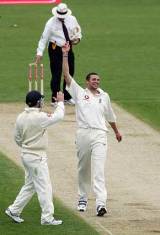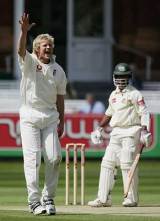Gains and losses in the six-day war
Cricinfo sums up the gains and losses incurred during a bizarre six-day war.
Andrew Miller
05-Jun-2005
There really is nothing more that can be said about the series just passed. Ian Bell, with a century before lunch to his name on Saturday, summed the situation up last night, when he admitted that the bowlers he had just spanked around the park were less of a challenge than your average county attack.
What, though, of the challenge ahead? Australia have arrived and the summer is about to begin in earnest, but after a warm-up of this one-sidedness, are England remotely prepared for what is about to hit them? Here, Cricinfo sums up the gains and losses incurred during a bizarre six-day war.
|
|

|
Steve Harmison's confidence. A tally of 10 wickets in two Tests is no great shakes, although it is one more than he managed on that
traumatic tour of South Africa last winter. His first-day performance at the Riverside was as explosive as anyone could have wished, and the 90mph yorker that dismissed Habibul Bashar would have troubled even the best of Australia's batting line-up.
Harmison says he has an extra gear to unleash on the Aussies, although
there must be a strong temptation to wrap him in cotton wool until the
start of the Ashes. If he is truly England's trump card, then why play him in seven largely irrelevant one-day games? The Aussies, naturally, would claim he was running scared, but bear in mind, they never had any qualms about hiding Shane Warne during the 1993 Texaco Trophy. And look how that little ruse turned out.
Andrew Flintoff's fitness. Compare and contrast Freddie's recovery (or lack of) after his hernia operation in 2002-03, to the Lazarus impersonation he has pulled off in 2005. He flew home from South Africa at the end of January to have a spur on his left ankle removed, and the initial prognosis was that he would take no part in the Bangladesh series whatsoever, or at least play only as a batsman.
In the event, the exact opposite has occurred. Flintoff bowled 21 fiery
overs in the second Test, having eased his way back with five wickets in an exploratory performance at Lord's, and though he was inked in at No. 6, he was not required to bat even once, thanks to the unfailing success of the England top five. That scenario, as Vaughan admitted, was not ideal, but there will be plenty opportunities in the one-dayers for Freddie to put bat to ball.
|
|

|
Ian Bell's arrival. Three into two didn't go in South Africa this winter, so Bell was the unlucky man to miss out when the tour party was unveiled. But Mark Butcher and Robert Key were unable to stake an unassailable claim to the middle-order rights, leaving the way clear for England's most assured newcomer since, well, Andrew Strauss.
The beauty of Bell's batting is its anonymity. Because he plays every ball precisely on its merits, he has never yet looked in a hurry at the crease, not even while milking 105 runs in a session on Saturday morning. He is unlikely ever to approach that sort of run-rate again, but there is every reason to believe he can survive against Australia, and ultimately flourish.
Geraint Jones's keeping. Never mind the little controversy surrounding that catch. A more savvy cricketer than Nafees Iqbal would have stood his ground, and the moment would have passed after a brief consultation. Nafees, and Bangladesh as a whole, will be older and wiser for the experience, and that, after all, is what this tour is all about.
For Jones, the feeling of ball on glove is the more important aspect. South Africa was a tough tour, made tougher by his unfortunate habit of diving blindly in front of first slip and so unsettling his slip cordon as well as himself. Here, his footwork was first-rate, thanks in no small part to his one-on-one sessions with Jack Russell, and a tally of nine catches in the match took his career haul past 50 dismissals - an important milestone for one so doubted.
|
|

|
Matthew Hoggard's no-ball problem. When asked who he thought would be the England's biggest threat to the Australians, Habibul Bashar immediately plumped for Hoggard - a curious choice that said more about Bangladesh's unfamiliarity with swing bowling, rather than any genuine form on Hoggard's part. For in truth, though he finished with a flourish with his fifth five-wicket haul in Tests and the Man-of-the-Match award at Chester-le-Street, Hoggard did not enjoy an impressive series.
Michael Vaughan certainly wasn't fooled by his performance. At Lord's, he and Harmison were profligate with the new ball; at the Riverside, Hoggard was withdrawn after three ineffectual overs. What is more, he served up 23 no-balls in the two games, and resorted to running in with his eyes closed in a bid to rediscover his rhythm. It was an apt metaphor for a series in which England were not exactly challenged, but a worrying sign nonetheless. Fortunately, with no one-day duties to distract him this month, he'll have plenty time to groove his action in county cricket before Lord's.
England's spin options Two years ago, the question on everyone's lips was "what is the point of Ashley Giles?" It was a cruel jibe, but at the time a valid one, for Gilo's role in the side had not been properly defined. It took a renaissance series against New Zealand this time last year to finally put an end to the bickering, but with his fitness in doubt because of a dodgy hip, the issue of his replacement has resurfaced. So, let it now be asked, what is the point of Gareth Batty?
Until his 15 overs at the death of the series, Batty's only notable contribution had been a miraculous catch at square leg. Duncan Fletcher loves his utility players, but in Batty's case, his versatility has usually outweighed his impact with the ball. And it has ever been thus - in Sri Lanka two winters ago, his improbable batting success against Muttiah Muralitharan meant that England's best attacking spinner, Robert Croft, was omitted from the decisive Test of the series. The result? England lost by an innings and 215 runs. Australia will have taken note.
Bangladesh's development. Not strictly relevant to England's Ashes prospects, but valid nonetheless to the English summer. The pleasure of watching England ease to their tenth consecutive home Test victory has been severely tempered by the quality of resistance on display, and with the most pointless triangular tournament in history to follow, it can only be hoped that Bangladesh can take heart from their second-innings performance come the one-dayers.
I wouldn't bet on it. As Vaughan noted, the Bangladeshis like to go for their shots, but for every occasion in which Aftab Ahmed's strokeplay pays off, there are likely to be ten occasions in which he holes out to cover for a 14-ball 20. Bangladesh's record in one-day internationals is pitiful - this form of the game is supposedly a lottery, and yet they have won just twice against senior opposition in 20 years of trying. They have been in disarray so far on this most testing of tours. For everyone's sake, we must hope they have now overcome the worst of the culture shock.
Andrew Miller is assistant editor of Cricinfo